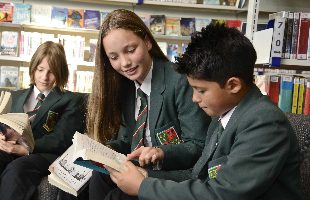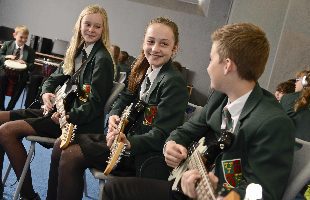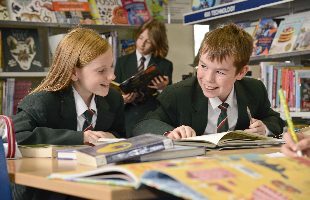English
Language
Language is the roadmap of a culture. It tells you where its people came from and where they are going’
Rita Mae Brown
Literature
‘Books Are A Uniquely Portable Magic’
Stephen King
Year 7
The Rationale
To build on the core skills of English learned in primary school. To learn to question, analyse and evaluate what writers do and to be able to develop their own ideas and interpretations of a variety of fiction and non-fiction texts. To support these ideas with evidence securely grounded in the text. The thematic link between all units of work in Year 7 is nature, the environment and the natural world. We want students to learn to appreciate the world they inhabit and to consider how the natural world has been framed in novels, poetry and newspaper articles. We also want students to take this learning forward into their own creative writing to use language to build narratives and characters from their own imaginations.
| Autumn Term 1 | Autumn Term 2 | Spring Half Term 3 | Spring Half Term 4 | Summer Term 5 | Summer Term 6 | |
|---|---|---|---|---|---|---|
| Curriculum Knowledge | Transition Unit – The Lost Words Students will study a range of texts focused on nature. The students will study Robert Macfarlane’s The Lost Words, leading to an understanding of the history of the English language through vocabulary. They will also consider the concept of rewilding. They will develop their understanding of key components of poetry. | Class Novel Students will have the opportunity to study a complete novel, read with the whole class. They will develop their understanding of key components of any literary novel: character, plot, setting, narrative voice, themes, language, structure, context etc. | The Natural World Students develop their base knowledge skills in reading and writing, fiction and nonfiction, which they were introduced to in the Transition Unit and the Class Novel. | Nature Poetry Students will be Introduced to poetry focusing on the theme of nature. This SOW will help to encourage an enjoyment of reading poetry. It will focus on understanding meaning in poetry | Gothic Literature Students will gain an understanding of the main elements of Gothic Literature – genre, language and structure. They will adapt their own writing and produce writing in the Gothic style. They will be reading a range of 19th century Gothic fiction and identifying typical language, structure, themes, characters and motifs. | ShakespeareIn development |
| Subject Skills | Building vocabulary Making inferences and deductions Analysing writers’ choices of language and structure Exploring poetic techniques Teamworking, creative and critical thinking skills Comparing texts Peer and self assessment strategies Explore how to craft a formal letter Explore how to prepare a speech | Novel openings, first impressions and making predictions Exploring character creation through short extracts Tracking character development Exploring key themes, big ideas and story structure Exploring extracts from a novel | Developing interpretations of texts Supporting ideas with evidence Using language to build character and narratives Using language to construct arguments | Developing inferences Exploring metaphorical language Investigating how character and narrative are established in poetry | Exploring traditional Gothic features in literary texts with a focus on 19th Century extracts/ stories and modern adaptations of the Gothic genre Exploring novel openings, first impressions and making predictions Creating characters through short extracts Looking at character development through tracking within a story or extract Key themes, big ideas and story structure Appreciation of art linked to the Gothic genre Narrative and descriptive writing | Exploration of Shakespeare’s language and method Mastering interpretations, ideas and using evidence to support them. |
| How can you help your child engage with the content? | Discuss issues around the environment to build their cultural capital. Encourage them to read a variety of books and articles from our library. Walk outside and engage with the environment and the wonders of nature. | Discuss the class novel with your son/daughter. Encourage them to read linked novels from our library. Encourage depth and detail when helping them with homework tasks. | Encourage your son/daughter to take an interest in environmental issues, building on your discussions from the first unit. Use the environment to help them to connect with nature and inspire creativity in their own writing. | Make the reading of poetry part of their reading routine. Encourage them to see poetry as an exciting opportunity to explore feelings and emotions through language. | Explore the Gothic through reading and films together. Encourage them to dip in and out of the texts on our recommended reading/viewing lists. | |
| Curriculum Opportunities | An author visit from Danny Rurlander. | A visit to Dove Cottage in Grasmere. | A visit to see a Shakespeare play, depending on programmes in local theatres. |
Year 8
The Rationale
To encourage students to find their own place and their own voice in the world by exploring current issues around social justice and prejudice in society. We want students to become independent and free thinkers and to never stop questioning the structures of power in society. The students should come to explore their place in society and reflect on how others experience the world differently from themselves. This thematic link will act as a springboard to developing their skills of inference, analysis and evaluation. They will explore a wide variety of writers’ viewpoints and perspectives and how these are achieved through methods of language and structure. Students will also build on their own creative writing skills to respond to social issues from racism to linguistic prejudice.
| Autumn Term 1 | Autumn Term 2 | Spring Half Term 3 | Spring Half Term 4 | Summer Term 5 | Summer Term 6 | |
|---|---|---|---|---|---|---|
| Curriculum content | Class Novel Students will have the opportunity to study a complete novel, read with the whole class. They will develop their understanding of key components of any literary novel: character, plot, setting, narrative voice, themes, language, structure, context etc. | How We Treat Others Students will explore and experience extracts from 19th-century fiction, classic poetry, and non-fiction from the 19th century and the present day. These mirror the kinds of texts students will meet at Key Stage 4. The extracts step up in word count and complexity across the three years of Key Stage 3 to gradually build reading stamina. | Social Justice Students will have the opportunity to explore a range of texts dealing with the theme of social justice. These will explore world issues including racism, sexism, bullying, othering, rebellion, morality, dissent and repression. They will have the opportunity to consider a variety of viewpoints in relation to social issues and to form their own through discussion and creative writing. | Shakespeare Students will have the opportunity to explore a range of Shakespeare texts dealing with the themes of prejudice, gender representation and colonialism. They will have the opportunity to consider a variety of viewpoints in relation to these social issues and to appreciate the context in which Shakespeare was writing and how this may have led to negative representations of minority groups. They will also develop their skills of empathy by writing from their own and characters’ point of view. They will also have the opportunity to build on their learning about Shakespeare’s world, life and work from Year 7. | Growing Up Students will explore and experience extracts from 19th-century fiction, classic poetry, and non-fiction from the 19th century and the present day. These mirror the kinds of texts students will meet at Key Stage 4. The extracts step up in word count and complexity across the three years of Key Stage 3 to gradually build reading stamina. As well as being skills-rich, the projects are also knowledge-rich. The lessons encourage students to think critically and make meaningful links between texts, and to compare present-day experiences to those in the past, via thoughtful questioning and opportunities for exploration. | Critical Language Awareness In development |
| Key Skills | Explore novel openings, first impressions and making predictions Explore character creation Track character development Explore narrative viewpoint/point of view Explore key themes, big ideas and story structure Explore extracts from a novel Study relevant social and historical context | Develop skills of inference Interpreting characters Develop understanding of structure and sequence of poetry Develop understanding of writer’s choices Develop understanding of ideas in poetry Develop understanding of writer’s intention Develop creative writing Plan and write first-person narrative Develop comprehension Develop empathy and understanding Develop understanding of persuasive language Writing of a speech | Recognise bias and objectivity. Comparing fiction and non-fiction. Recognise how texts are shaped by the technology they use. Identify implied and explicit meanings. Commentary and description in narrative. Figurative language in conveying a sense of character and setting through analysis of fiction, non-fiction and creative writing. | Build on their historical knowledge about Shakespeare’s life using research, comprehension and interpretation skills. Explore a variety of Shakespeare texts in order to explore representations of minority groups. Recognise how texts are shaped by the contexts in which they are produced and received. Identify the ways implied and explicit meanings are conveyed in different texts. Develop the use of persuasive, argumentative and discursive style by writing to present a viewpoint. | Comprehension of a 19th-century fiction text Inference and deduction to explore character How language choices add to characterisation and meaning How poets uses language features Secure use of the WHW method when exploring poetry Recognise features of first-person and autobiographical writing Use those features in their own writing Discuss ideas about anti-social behaviour in the 19th century Comprehension of a 19th-century non-fiction text Understand writer’s use of language techniques to sensationalise their writing and express a viewpoint Understand writers’ key ideas Explore and comment on writers’ point of view Techniques of a persuasive speech Write an op-ed for a magazine, arguing both sides of a topic | |
| How can you engage with your child? | Discuss issues around the novel they’re reading to build their cultural capital. Encourage them to read a variety of fiction and non-fiction books and articles from our library, which are topic related. Research the historical background to the novel together to get a deeper understanding of the issues. | Continue to encourage reading at home. Discuss some of the issues around prejudice with your child and talk about key moments in history, which will illuminate the texts they are studying. | Discuss and research black British History together, including our involvement in the slave trade and the Windrush migration/scandal. Look at news stories surrounding the Black Lives Matter movement, Feminism and LGTBQ+ rights. | Encourage students to engage with film versions of Shakespeare plays, watch them together. Engage with online resources RSC and Shakespeare’s Globe to encourage deeper learning of Shakespeare’s plays and language. | Check your child’s homework and bookwork to ensure they’re achieving sufficient depth in response to the texts they’re studying. Read the texts aloud with your child and clarify/research unfamiliar vocabulary. | |
| Curriculum Opportunities | Sponsored rough sleep | Christmas Food Bank collection | LGBTQ Club (JWr) |
Year 9
The Rationale
In Year 9 the students make advancements in terms of complexity. The theme for the year is conflict and this is explored through a variety of exciting and enriching units of work. We give the students the opportunity to explore conflict on a number of levels from global and local conflict to personal and inner conflict. We want students once again to step into others’ shoes and develop their ways of seeing the world. Through the exploration of complex and rewarding texts, students use the topic to refine their skills of reading and writing in preparation for GCSE.
| Autumn Term 1 | Autumn Term 2 | Spring Half Term 3 | Spring Half Term 4 | Summer Term 5 | Summer Term 6 | |
|---|---|---|---|---|---|---|
| Curriculum content | Attitudes to War Students explore a range of literary fiction and non-fiction with a focus on war before crafting a written piece of their own. This unit gives pupils the opportunity to express their own attitudes and viewpoints in written form. Texts will include a wide range of types/styles – poetry, song lyrics, novel extracts, news reports, letters, diary entries, advertisements, interviews and even propaganda. | Shakespeare Students experience a full Shakespeare play before encountering one at GCSE. This unit is designed to allow the students to enjoy the experience of a full Shakespeare play. Students will increase their familiarity and confidence with Shakespeare’s use of language, typical characters and dramatic methods. | The Great American Story Students study a complete American novel or drama, read with the whole class. The texts are all American Literature as it will be their last opportunity to study any literature other than English. They will develop their understanding of key components of any literary novel: character, plot, setting, narrative voice, themes, language, structure, context etc. | The Great American Story A continuation of Spring Half Term 3. The students use the whole term to reflect the time taken to thoroughly explore the text at a precise analytical level. | Crime and Punishment Students explore extracts from 19th-century fiction, classic poetry, and non-fiction from the 19th century and the present day. These mirror the kinds of texts students will meet at Key Stage 4. The extracts step up in word count and complexity across the three years of Key Stage 3 to gradually build reading stamina. The text-based work also steps up in terms of skills to introduce and embed clear methods for comprehension work (AO1 at GCSE) and clear approaches for analysing language and structure (AO2 at GCSE).The lessons encourage students to think critically and make links between texts, and to compare present-day experiences to those in the past, via thoughtful questioning. | Crime and Detective Fiction An understanding of the main elements of Detective Literature – genre, language and structure. An improvement in descriptive writing skills and use of detective fiction features. An ability to adapt their own writing and produce writing in this style. To be able to read a range of 19th century and modern detective fiction and identify typical language, structure, themes, characters and motifs. |
| Key Skills | Study fiction and non-fiction Identify viewpoints and attitudes towards war. Understanding contextual knowledge of war and attitudes to war Research specific conflicts/wars | Exploration of Shakespeare’s plays Read a complete Shakespeare play – any play can be chosen apart from plays named on the AQA GCSE specification Understanding of dramatic plot and characterisation Linguistic, structural and thematic analysis skills Explore a range of contexts appropriate to the specific play Explore key themes and big ideas found in Shakespeare’s plays | Novel openings, first impressions and making predictions for prose Exploring character creation through short extractsTracking character development Dramatic devices, staging, props, entrances and exits etc for drama Exploring key themes, big ideas and story structure Exploring key quotations relevant to character/theme Study of relevant social and historical context | Understand 19th-century fiction Explore characters’ thoughts and feelings Explore a 19th-century text Critical evaluation of a text Secure use of the WHW method when exploring poetry Evaluate poets’ point of view Identify and analyse language and structure Understand conventions of crime and detective fiction Structure, plan and write crime fiction Exploration of ideas and attitudes in 19th-century non-fiction texts Consider how ideas and attitudes are presented Exploration of ideas in 19th-century non-fiction texts Comprehension skills Understand writers’ viewpoint Comparative response Secure conventions of arguing a case | Exploring: conventions of crime/detective fiction & development of conventions in different eras Typical Novel openings, first impressions and making predictions Typical Characterisation & narrative voice/perspective Creation of stock characters Story openings Descriptive techniques Sentence construction & variation | |
| How can you engage with your child? | Discuss the history of war in the UK. Discuss attitudes to war and read a variety of news reporting about war. Watch age appropriate war movies and TV programmes. | Discuss the play with your son/daughter. Discuss inner conflicts and moral dilemmas experienced by characters. | Read around the novel with your son/daughter. Research the historical context around the text. Discuss the text and other novels/plays by the author. | Watch various film versions of the text and discuss the differences and how well they capture the characters, plot and theme. | Discuss moral implications of social issues around crime. Explore texts together through homework. | Read around the genre by exploring the reading list of modern and classic examples of crime fiction. |
| Curriculum Opportunities | Possible theatre visit or film performance | Theatre visit/Film |






